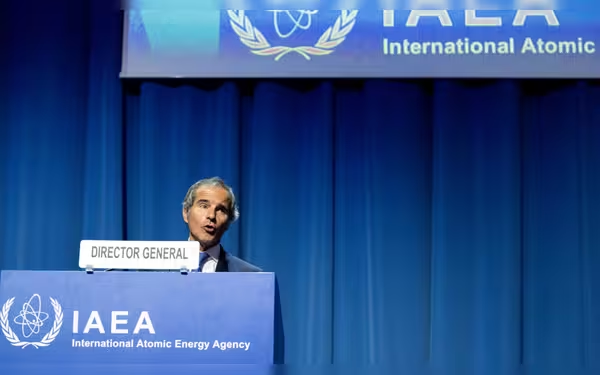Saturday, November 16, 2024 10:33 PM
Iran Nuclear Negotiations: IAEA Chief Reports Willingness to Re-Engage
- Iran shows willingness to discuss nuclear program.
- IAEA chief optimistic about renewed dialogue.
- Skepticism remains among European nations.
 Image Credits: arabnewspk
Image Credits: arabnewspkIAEA chief Rafael Grossi indicates Iran's willingness to re-engage in nuclear discussions, raising hopes for renewed dialogue amid ongoing tensions.
The ongoing nuclear negotiations involving Iran have been a focal point of international relations since the landmark nuclear deal, known as the Joint Comprehensive Plan of Action (JCPOA), was established in 2015. This agreement aimed to limit Iran's nuclear capabilities in exchange for the lifting of economic sanctions. However, the situation took a dramatic turn in 2018 when the United States, under then-President Donald Trump, withdrew from the deal and reinstated sanctions, prompting Iran to ramp up its nuclear activities. As tensions have escalated, the role of the International Atomic Energy Agency (IAEA) has become increasingly critical in monitoring Iran's nuclear program.
Recently, Rafael Grossi, the head of the IAEA, indicated that Iran is showing a "willingness" to re-engage in discussions regarding its nuclear program. This statement comes after Grossi's meeting with Iran's Foreign Minister Abbas Araghchi, who was instrumental in the original negotiations of the JCPOA. Grossi noted that there are signs of Iran's openness to not only re-engage with the IAEA but also with the other signatories of the 2015 agreement. He expressed optimism about the potential for renewed dialogue, stating, "It’s a moment where there is a possibility to do something" on the nuclear question.
Despite this apparent willingness, Grossi emphasized that Iran remains firm in its decision to deny access to some of the IAEA's top inspectors. This decision was initially framed by Tehran as a response to what it termed "political abuses" by Western nations, including the United States, France, Germany, and Britain. Grossi acknowledged that while there may be a review of the inspector ban, it is unlikely that Iran will fully restore access to these inspectors.
In recent years, Iran has significantly increased its nuclear activities, including enriching uranium to levels close to those required for developing a nuclear weapon. However, the election of Iranian President Masoud Pezeshkian in July has led to a shift in tone, with Tehran signaling a readiness to revive discussions aimed at restoring the JCPOA. Grossi remarked that if negotiations proceed positively, there could be a return to conversations with former partners in the agreement.
As Grossi prepares for a visit to Tehran in the coming weeks, he aims to discuss various monitoring and verification measures that could be agreed upon before any broader agreement is reached. He stressed the importance of establishing a baseline of Iran's nuclear capabilities to foster trust and confidence in the negotiation process.
However, skepticism remains among European nations regarding the feasibility of returning to the original framework of the JCPOA. Grossi acknowledged that the future of the agreement is uncertain, stating, "Will it be the same? Will it be updated? Will it be something completely different? This is for them to decide."
The path forward for Iran's nuclear negotiations is fraught with challenges, yet the recent indications of willingness to engage in dialogue offer a glimmer of hope. As the international community watches closely, the outcome of these discussions could have significant implications not only for regional stability but also for global security. The stakes are high, and the world awaits to see if diplomacy can prevail over discord.













